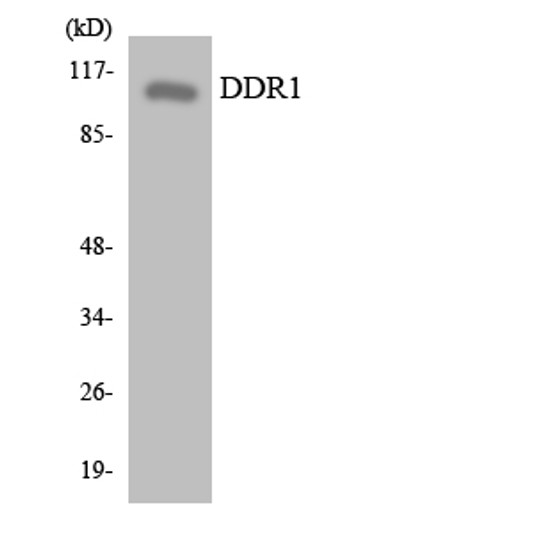| Post Translational Modifications | Autophosphorylated in response to fibrillar collagen binding. Glycosylation of Asn-211, but apparently not of Asn-260 or Asn-394, prevents autophosphorylation from occurring in the absence of collagen. |
| Function | Tyrosine kinase that functions as a cell surface receptor for fibrillar collagen and regulates cell attachment to the extracellular matrix, remodeling of the extracellular matrix, cell migration, differentiation, survival and cell proliferation. Collagen binding triggers a signaling pathway that involves SRC and leads to the activation of MAP kinases. Regulates remodeling of the extracellular matrix by up-regulation of the matrix metalloproteinases MMP2, MMP7 and MMP9, and thereby facilitates cell migration and wound healing. Required for normal blastocyst implantation during pregnancy, for normal mammary gland differentiation and normal lactation. Required for normal ear morphology and normal hearing. Promotes smooth muscle cell migration, and thereby contributes to arterial wound healing. Also plays a role in tumor cell invasion. Phosphorylates PTPN11. |
| Protein Name | Epithelial Discoidin Domain-Containing Receptor 1Epithelial Discoidin Domain Receptor 1Cd167 Antigen-Like Family Member ACell Adhesion KinaseDiscoidin Receptor Tyrosine KinaseHgk2Mammary Carcinoma Kinase 10Mck-10Protein-Tyrosine Kinase 3aProtein-Tyrosine Kinase Rtk-6Trk ETyrosine Kinase DdrTyrosine-Protein Kinase CakCd Antigen Cd167a |
| Database Links | Reactome: R-HSA-3000171 |
| Cellular Localisation | Isoform 1: Cell MembraneSingle-Pass Type I Membrane ProteinIsoform 2: Cell MembraneIsoform 3: SecretedIsoform 4: Cell Membrane |
| Alternative Antibody Names | Anti-Epithelial Discoidin Domain-Containing Receptor 1 antibodyAnti-Epithelial Discoidin Domain Receptor 1 antibodyAnti-Cd167 Antigen-Like Family Member A antibodyAnti-Cell Adhesion Kinase antibodyAnti-Discoidin Receptor Tyrosine Kinase antibodyAnti-Hgk2 antibodyAnti-Mammary Carcinoma Kinase 10 antibodyAnti-Mck-10 antibodyAnti-Protein-Tyrosine Kinase 3a antibodyAnti-Protein-Tyrosine Kinase Rtk-6 antibodyAnti-Trk E antibodyAnti-Tyrosine Kinase Ddr antibodyAnti-Tyrosine-Protein Kinase Cak antibodyAnti-Cd Antigen Cd167a antibodyAnti-DDR1 antibodyAnti-CAK antibodyAnti-EDDR1 antibodyAnti-NEP antibodyAnti-NTRK4 antibodyAnti-PTK3A antibodyAnti-RTK6 antibodyAnti-TRKE antibody |
Information sourced from Uniprot.org










